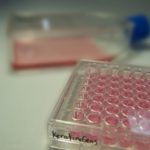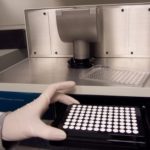KeratinoSensTM is a cell-based reporter gene assay that models the second key event in the Adverse Outcome Pathway for Dermal Sensitization (keratinocyte activation). The assay measures the induction of a stably transfected luciferase gene under the control of the antioxidant response element (ARE) derived from the human AKR1C2 gene.

Cells are seeded into 96-well plates for use in the KeratinoSens assay for skin sensitization.
Following the methodology described in OECD Test Guideline 497, KeratinoSens is an alternative to animal testing methods necessary for the purpose of hazard identification. In conjunction with other in vitro tests, the results of this assay can also be used to provide information regarding a test material’s potency for inducing skin sensitization.
IIVS has participated in validation studies led by the developer to ensure that it is transferable, reproducible, and predictive as compared to the historical animal data. Following extensive review of the validation data, the KeratinoSens assay has received endorsements by the European Commission on the Validation of Alternative Methods (ECVAM), and is performed according to an internationally-recognized test guideline (OECD 442D).
Features
- Human Keratinocyte Cell Line (HaCaT) Model
- At least two independent runs performed
- Compatible with fully soluble, or stable homogenous suspensions of test chemicals
- IIVS has considerable experience with testing mixtures and identifying sensitizers in complex matrices
- Cytotoxicity assessment included
- Internationally recognized (OECD) test guideline

